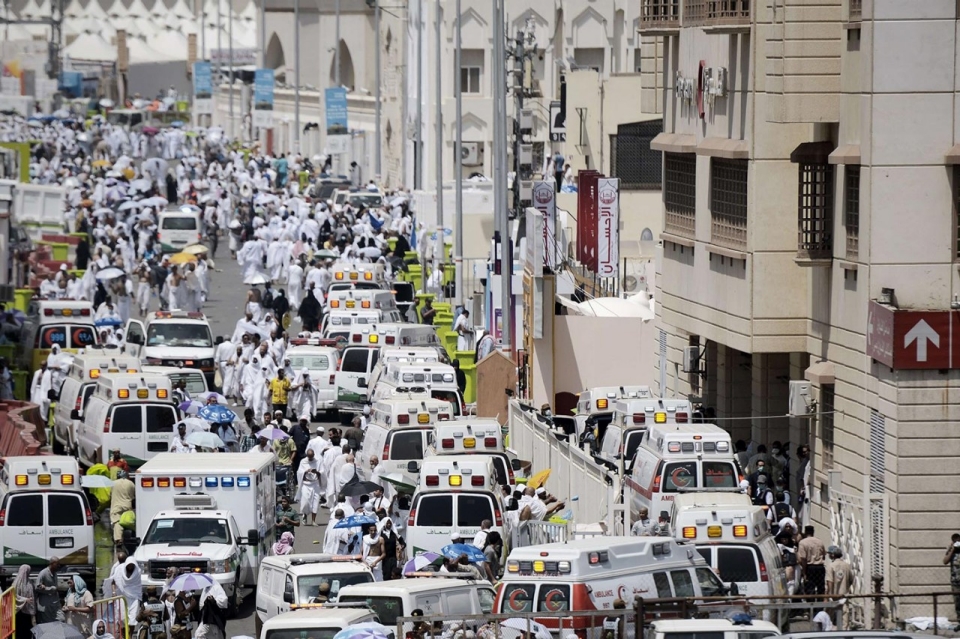
The elevated tensions could not have come at a worse time — just as Iran and Saudi Arabia are both set to attend multination talks on resolving the conflict in Syria. Iran, which backs the Syrian president, Bashar al-Assad, is attending the talks for the first time. Saudi Arabia opposes Assad.
This year's Hajj stampede deadliest in history
The most prominent Iranian missing in the Hajj stampede outside Makkah on September 24 is Ghazanfar Roknabadi, a former ambassador to Lebanon and a key figure in Iran’s involvement in Lebanese politics and the Syrian war.
Roknabadi, who served in Lebanon until 2014, was last seen by Iranian witnesses in the aftermath of the stampede, a deputy foreign minister, Hossein Amirabdollahian, told the Tasnim news agency on Thursday.
“We are seriously pursuing the case of Roknabadi, our former ambassador to Beirut. Witnesses confirm seeing Roknabadi alive until he was transferred to a Saudi ambulance,” Amirabdollahian said. Iranian forensic experts have said they have not found a match with Roknabadi among the remains presented to them by Saudi officials.
Iran protests Saudi delay in repatriating hajj dead
While the remains of 399 Iranians are now accounted for, 65 Iranians are still missing, including Roknabadi, and 29 may have been buried in Saudi Arabia, state television reported on Tuesday.
Saudi Arabia has said that 769 people died in the stampede. The Associated Press, in an independent count, has reported that 2,177 people died. Iran has accused Saudi officials of blocking a main road in order to let the convoy of a high official pass, leaving the pilgrims suddenly facing a dead end. As masses started backing up, a panic broke out. Saudi Arabia has said Iran’s Islamic Revolutionary Guards Corps orchestrated the disaster.
Iranian officials are now openly contemplating whether Roknabadi and others have been abducted as a part of the deeper mistrust between the two rival nations.
Iran’s Khamenei demands Saudi apology for Hajj deaths
“Considering his unknown status, the officials of our country consider the likelihood that these individuals have been abducted or there has been a plot against them. So the Saudi government and officials should be accountable in this respect,” Alaeddin Boroujerdi, who heads the Iranian Parliament’s foreign policy commission, told the semiofficial Mehr News Agency.
Suspicions have been further aroused in Iran over what the Iranians have called a Saudi refusal to release security camera images of the stampede disaster that would allow an independent investigation of the cause. The Saudis have long boasted of having deployed at least 5,000 security cameras around the pilgrimage site.
Iran, which is majority Shia, and Saudi Arabia, majority Sunni, are entangled in several disputes, most notably the conflicts in Syria, Iraq and Yemen. They are also competing for support in Lebanon and the Palestinian territories.
Iran holds anti-Saudi protest over hajj stampede deaths
Saudi Arabia viewed Roknabadi as a mastermind of Iranian operations against its regional allies. He survived a bombing at his embassy and, in private, Iranian security officials say that Saudi Arabia has organised at least two other assassination attempts against Roknabadi.
This article originally appeared on The New York Times, a partner of The Express Tribune.



1731916090-0/sabrina-(3)1731916090-0-165x106.webp)













COMMENTS (3)
Comments are moderated and generally will be posted if they are on-topic and not abusive.
For more information, please see our Comments FAQ